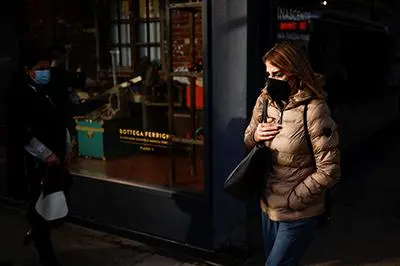PHOTO
ROME - Italy on Wednesday scrapped self-isolation rules for those coming into contact with someone testing positive for coronavirus providing they have had a booster shot, have recently recovered or been vaccinated.
The move comes after health experts urged the government to rethink its policies amid worries that the spread of the highly contagious Omicron variant could paralyse the country by forcing millions to stay at home.
Under the Italian measures, isolation will no longer be required for those who had a positive contact but have had a booster dose, have been vaccinated or have recovered from the illness within the last 120 days, a Cabinet statement said.
They will have to wear a more protective Ffp2 (equivalent to KN95 or N95 in other regions) mask for 10 days and, only if they have symptoms, take a test within five days since the contact with the positive person.
"I think it is reasonable to apply different rules to those citizens who have followed the government's indications, taking two doses and then the booster," said health undersecretary Andrea Costa.
The government further tightened the restrictions on the unvaccinated.
From Jan. 10 more activities - including open-air restaurants, hotels and ski lifts - will be open only to the vaccinated and those who recently recovered from the disease. The same rules will be valid for public transports.
Daily coronavirus cases have soared in Italy this week, peaking at a record 98,030 on Wednesday, with the number of hospitalised patients rising.
Rules for the holiday period had already been tightened. Prime Minister Mario Draghi's administration banned concerts and open-air events, shutting down discos until Jan. 31.
Italy has also imposed restrictions on travellers, including those from inside the European Union who now need to take a coronavirus test before departure.
The Italian vaccination campaign has proved effective with almost 80% completing an initial vaccine cycle and around 30% receiving a third shot.
(Reporting by Angelo Amante Editing by Giles Elgood and Sandra Maler) ((Angelo.Amante@thomsonreuters.com;))





















